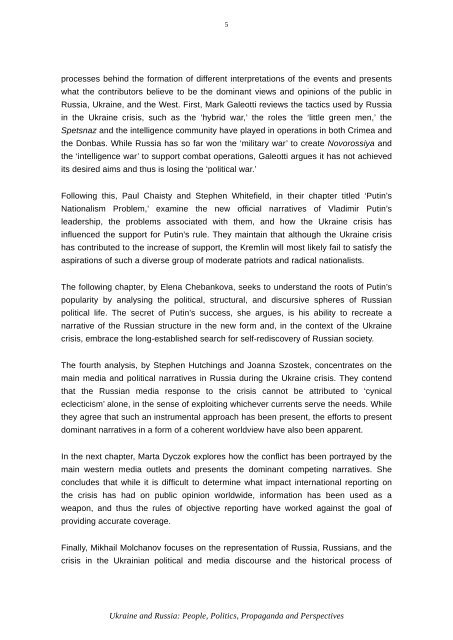Ukraine-and-Russia-E-IR
Ukraine-and-Russia-E-IR
Ukraine-and-Russia-E-IR
You also want an ePaper? Increase the reach of your titles
YUMPU automatically turns print PDFs into web optimized ePapers that Google loves.
5<br />
processes behind the formation of different interpretations of the events <strong>and</strong> presents<br />
what the contributors believe to be the dominant views <strong>and</strong> opinions of the public in<br />
<strong>Russia</strong>, <strong>Ukraine</strong>, <strong>and</strong> the West. First, Mark Galeotti reviews the tactics used by <strong>Russia</strong><br />
in the <strong>Ukraine</strong> crisis, such as the ‘hybrid war,’ the roles the ‘little green men,’ the<br />
Spetsnaz <strong>and</strong> the intelligence community have played in operations in both Crimea <strong>and</strong><br />
the Donbas. While <strong>Russia</strong> has so far won the ‘military war’ to create Novorossiya <strong>and</strong><br />
the ‘intelligence war’ to support combat operations, Galeotti argues it has not achieved<br />
its desired aims <strong>and</strong> thus is losing the ‘political war.’<br />
Following this, Paul Chaisty <strong>and</strong> Stephen Whitefield, in their chapter titled ‘Putin’s<br />
Nationalism Problem,’ examine the new official narratives of Vladimir Putin’s<br />
leadership, the problems associated with them, <strong>and</strong> how the <strong>Ukraine</strong> crisis has<br />
influenced the support for Putin’s rule. They maintain that although the <strong>Ukraine</strong> crisis<br />
has contributed to the increase of support, the Kremlin will most likely fail to satisfy the<br />
aspirations of such a diverse group of moderate patriots <strong>and</strong> radical nationalists.<br />
The following chapter, by Elena Chebankova, seeks to underst<strong>and</strong> the roots of Putin’s<br />
popularity by analysing the political, structural, <strong>and</strong> discursive spheres of <strong>Russia</strong>n<br />
political life. The secret of Putin’s success, she argues, is his ability to recreate a<br />
narrative of the <strong>Russia</strong>n structure in the new form <strong>and</strong>, in the context of the <strong>Ukraine</strong><br />
crisis, embrace the long-established search for self-rediscovery of <strong>Russia</strong>n society.<br />
The fourth analysis, by Stephen Hutchings <strong>and</strong> Joanna Szostek, concentrates on the<br />
main media <strong>and</strong> political narratives in <strong>Russia</strong> during the <strong>Ukraine</strong> crisis. They contend<br />
that the <strong>Russia</strong>n media response to the crisis cannot be attributed to ‘cynical<br />
eclecticism’ alone, in the sense of exploiting whichever currents serve the needs. While<br />
they agree that such an instrumental approach has been present, the efforts to present<br />
dominant narratives in a form of a coherent worldview have also been apparent.<br />
In the next chapter, Marta Dyczok explores how the conflict has been portrayed by the<br />
main western media outlets <strong>and</strong> presents the dominant competing narratives. She<br />
concludes that while it is difficult to determine what impact international reporting on<br />
the crisis has had on public opinion worldwide, information has been used as a<br />
weapon, <strong>and</strong> thus the rules of objective reporting have worked against the goal of<br />
providing accurate coverage.<br />
Finally, Mikhail Molchanov focuses on the representation of <strong>Russia</strong>, <strong>Russia</strong>ns, <strong>and</strong> the<br />
crisis in the Ukrainian political <strong>and</strong> media discourse <strong>and</strong> the historical process of<br />
<strong>Ukraine</strong> <strong>and</strong> <strong>Russia</strong>: People, Politics, Propag<strong>and</strong>a <strong>and</strong> Perspectives


